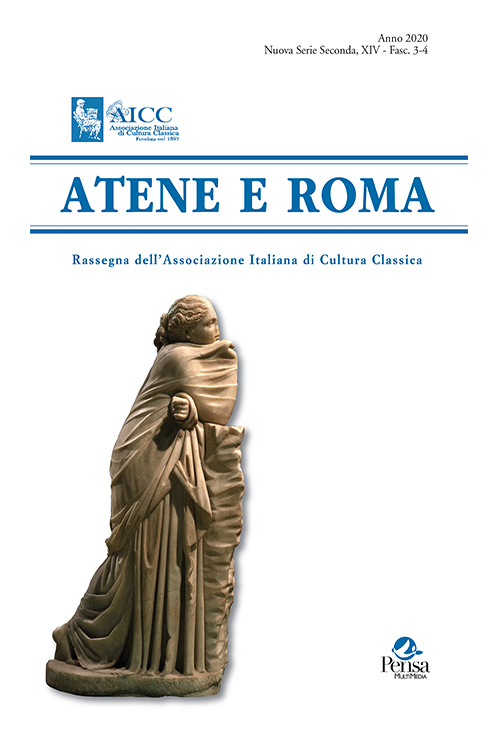CALLIMACHUS, POSIDIPPUS, HEDYLUS, ‘SOCLES’, AND ΧΑΡΙΣ
Callim. ep. 13 Pf. (AP VII 524) ~ Posidipp. 140 AB (IX G.-P., AP XII 168) ~ Hedyl. VI G.-P. (Ath. XI 473ab)
DOI:
https://doi.org/10.7347/AR-2020-p285Abstract
The author proposes a novel interpretation of three Hellenistic epigrams, all reflecting the competitive poetic milieu of the Alexandria Mouseion during the reigns of Ptolemy II Philadelphus and Ptolemy III Euergetes. Callimachus’ ep. 13 Pf. is a stinging satire against Posidippus, the Pellaean epigrammatist, in which the Cyrenaean poet, exploiting popular beliefs and a witty wordplay, declares that the only pleasant thing in Hades is that Posidippus is not heard. The criticism seems to depend on literary evaluation as well as on aesthetic theory, but a personal antipathy can hardly be concealed. This antipathy of the erotic and drinker poet to the self-restrained and sober poet must lie in Posidippus’ epigram 140 AB, a self-referential apologetic and confessional poem, where, with one or two minor emendations, the poet admits his shortcomings and promises to change over to the opposite camp–rather metaphorically than in truth. The general term that covers the differences between the two poets is χάρις, ‘grace, charm, delight’. So Callimachus in ep. 13 renames himself playfully Χαρίδας, and Posidippus in ep. 140 AB promises “to indulge in the future in a not too charmless (ἄχαριν) eros, whether sober or drunk”. An unknown poet named Σωκλῆς is also characterized by χάρις in the epigram VI G.-P. of Hedylus. Francesca Angiò has felicitously suggested that Σωκλῆς must be a pseudonym since he is compared with Asclepiades under the latter’s pseu-donym Σικελίδας. She proposed that the pseudonym can stand for Po-sidippus, but the whole description fits well Callimachus. Like Callimachus, Socles is a heavy drinker, more pleasant and more vigorous in his playfulness than Asclepiades, but significantly, in his playful poems ἐπιλάμπει ἡ χάρις, Callimachus’ key attribute. The only historical Socles, whose name might be possibly appropriated by Callimachus, is an otherwise unknown Corinthian, whose speech in an assembly of Sparta’s allies in 506 BCE is recorded in Hdt. V 92–93. He attacked the Spartans for planning to impose tyranny on Athens, reminding the adverse experience of his compatriots under the tyrannic rules of Cypselus and Periander in the archaic period. The unusually emotional style of the speech and its legendary narrative must have fascinated Callimachus who may have found the situations narrated in the speech parallel to his hometown’s recent history. Cyrene, from independence and self-government passed over to foreign despotic rule, a state of affairs adversely affecting Callimachus and his aristocratic family. The pen name Σωκλῆς must function differently than the other disguised personal names inside specific poems, like Βαττιάδης and Χαρίδας, furtively indicating a patriotic identity.


